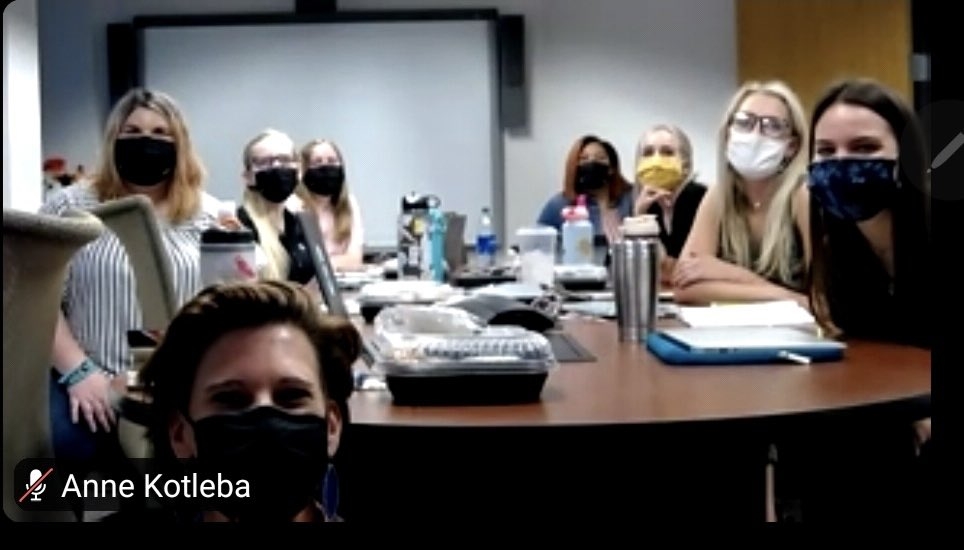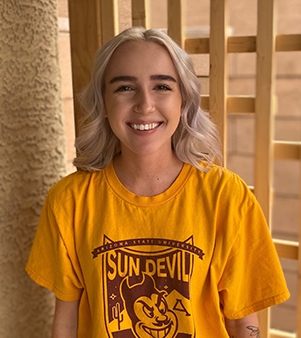
Newsroom

Nonprofit Leadership Alliance students launch Upswell campaign to support future leaders
by Alexandra Conforti, ASU Lodestar Center for Philanthropy and Nonprofit Innovation
October 20, 2020
Each winter, members of Arizona State University’s Nonprofit Leadership Alliance Student Association look forward to attending the Alliance Management Institute conference, the culmination of their studies towards earning the coveted Certified Nonprofit Professional credential. The annual event brings together Nonprofit Leadership Alliance (NLA) members from universities across the country, and ASU’s students get further experience by running their own fundraising campaign to attend.
COVID-19 concerns led to the cancellation of this year’s AMI conference. But the disruption turned NLASA members toward two new opportunities.
The first was Independent Sector’s Upswell Conference, which was hosted virtually on Oct. 14-16 and focused on COVID relief and anti-racism.
“Last Friday was the last day of the Upswell Conference and I can confidently say that it indeed impacted each and every one of us,” the student leadership team said in a statement.
The second is the chance to create a lasting legacy at ASU by raising money for future NLA students.
The 2020 Upswell Campaign’s fundraising goal is to raise $18,000 by Nov. 18. The money raised sent 11 NLASA students to the Independent Sector’s virtual Upswell Conference this month, where they engaged with professionals on the front lines of social justice and COVID-19 recovery, and it will also support 100 future nonprofit leaders in the Certified Nonprofit Professional (CNP) credential program.
Anne Kotleba, program coordinator for the Nonprofit Leadership Alliance, said that it was important to retain the conference opportunity for her students in order for them to “participate in this learning laboratory of how to run a fundraiser ... how to implement and organize an annual campaign,” even if it was virtual.
Kotleba said the benefits of having a virtual conference include the opportunity to bring in the biggest names across the nonprofit field without prohibitive travel costs, and that students had the ability to connect with new speakers in a transformative environment. Ibram X. Kendi, the author of “How to Be an Antiracist,” attended as one of the keynote speakers at Upswell, along with over 100 other speakers filling the 63 sessions over three days.

Interviews with some of the student leaders of the NLASA clarified the importance of the program, their previous experiences, and the goals for this year’s campaign.
 Haylee Davis, a member of the events committee for the NLASA this semester, said her interest in nonprofit work began in 2018 when working for the Tucson Jewish Community Center, a nonprofit that provides a day-program service for individuals with disabilities. Her current role there is “Inclusion Coordinator” for the Children & Youth department. Davis said the nonprofit field opened her up to new opportunities, “especially within disability inclusivity.”
Haylee Davis, a member of the events committee for the NLASA this semester, said her interest in nonprofit work began in 2018 when working for the Tucson Jewish Community Center, a nonprofit that provides a day-program service for individuals with disabilities. Her current role there is “Inclusion Coordinator” for the Children & Youth department. Davis said the nonprofit field opened her up to new opportunities, “especially within disability inclusivity.”
Davis said she is currently working to get her Certified Nonprofit Professional (CNP) credential and in the future is “looking to create inclusive spaces beyond recreation or in schools,” more within business and community centers.
Alexandra Conforti: What has your journey in the NLA been like for you?
HD: NLA has been great so far. This is my first semester, so I haven’t experienced as much as other people. But it has been awesome. I have specifically enjoyed meeting the people in my major and how we all have very diverse passions that fall under the umbrella of the nonprofit sector.
AC: Why is this year’s conference important?
HD: COVID-19 and Anti-Racism are major things happening in our communities right now. Understanding how nonprofits are meant to respond to crisis, or what they should be doing, is really important to know more about, especially because crisis can occur when we are future nonprofit professionals.
Decora Stevens, vice president and leader of the development committee for the NLASA, began her work in nonprofits through her high school and said she has always enjoyed the aspect of working in public service. Stevens made the switch her freshman year to study nonprofit management and hopes to work with nonprofits in the future “in the capacity of the state department or through foreign service” and has a focus on international NGOs.
AC: How has the nonprofit sector impacted you as a student, leader, and as a person?
DS: I definitely have taken a lot out of studying it, it’s just crazy how misunderstood the nonprofit sector is and how many people don’t understand the structure and the management style and all the unique components that go into managing a nonprofit. So for me, just being able to learn the ins and outs and the actual passion that is behind a lot of the leaders in this sector is incredible. … There’s just a different attitude overall, it’s not a self-serving promotional “I wanna get to the top” kind of attitude. It’s, “I want to help my community and I want to make a difference.” And that’s just something I like to surround myself with.
Stevens said that the Upswell conference focused on important conversations and allowed for engagement and discussions on issues that are essential to understand in order to move past the challenges of 2020.
AC: What has your journey in the NLA been like for you? What do you feel you have learned from this program?
DS: It really is an incredible program just because there’s so much emphasis on personal growth as well as just getting to know the people in the organization. … I like it because not everyone is on the same path, has the same interests, but we all have a service mentality. With the program, it gives you the practical skills and the connections to capitalize all of the things you’re learning.
AC: Why is this year’s fundraising campaign important?
DS: Raising money for the next hundred students who would like to pursue their CNP with the Nonprofit Leadership Alliance is really cool because it opens the doors and increases the opportunity for students who may otherwise not be able to afford it or not see the value right off the bat. It’s just a really valuable program and I really learned about how to operate an organization and build on our future missions.
AC: Do you think there are new areas to explore or positive results to be seen from a virtual conference?
DS: Yeah so it’s interesting I feel like virtual conferences are seen as a second alternative to meeting face to face, but with current technology and the conference management software available ...the capacity at which they can operate a successful and entertaining conference, I think, is very obtainable. … The type of data they can gather from this conference like the transcripts and recordings of all the speakers and questions that are asked, I’m sure they’ll be reusing a lot of these materials for other educational purposes.
Camille Auer, a member of the NLASA since last semester, said she was exposed to nonprofit work through her church and wants to work within the international sector with human rights. Auer said that the NLA has given her a platform “to understand what it looks like to be a leader in a professional setting and especially in a nonprofit setting” and that this conference brought forward a new experience for all members.
CA: Obviously I’m excited to learn about what it looks like to be an ally with Anti-Racism and hear from the speakers who have a lot of knowledge on these subjects. I’m excited to hear what COVID recovery is going to look like and also it’s just a responsible way to be hopeful about the future knowing that it’s going to look different, that there is something to hope for.
Kotleba described this year’s Upswell campaign as the “rising tide of the future.”
“These are the future nonprofit professionals, they’re the future executives, they’re the future development directors and program coordinators of our nonprofits, both here in the valley and throughout the country and abroad,” she said. “We see this campaign as not only supporting what our students are doing now but what they will go and do in the future.”